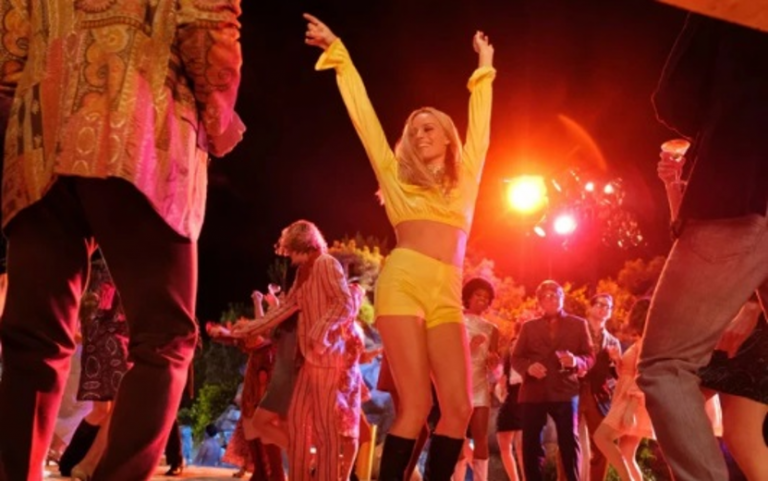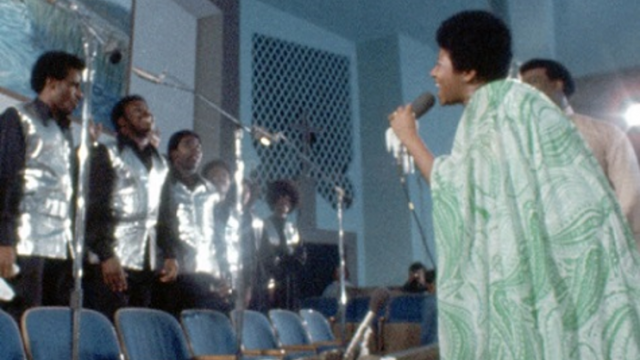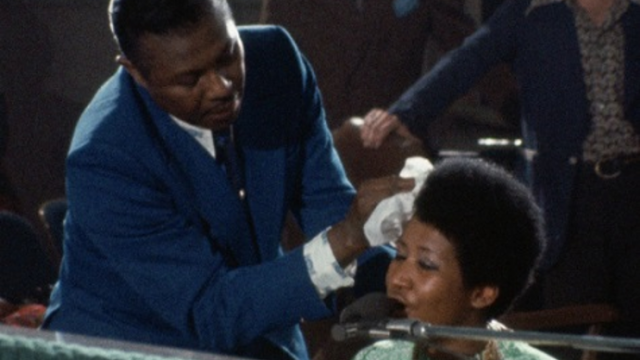Movies talk to each other. What did the films of 2019 have to say? This is a look at how two movies from the past year tackle similar subjects in different ways. Be warned: SPOILERS for both follow.
Fifty years ago, Sharon Tate was murdered, and a promising acting career died with her. A few years later Aretha Franklin gave two of the great performances of her long, acclaimed career, and while the intent was to preserve them for posterity, a remarkably boneheaded fuckup led to them being worse than lost – they were scrambled beyond repair. But maybe they could be fixed and Franklin’s accomplishment would be released from limbo. And maybe Tate could live onscreen again.
After the premiere of Once Upon A Time … In Hollywood, the discourse immediately centered around the paucity of lines given to Margot Robbie’s Sharon Tate, especially as compared to Leonardo DiCaprio’s Rick Dalton and Brad Pitt’s Cliff Booth – two fictional dudes who in the movie’s alternate history wind up killing the absolute shit out of the Manson gang before that gang can murder Tate. The hot takes got even hotter after an exchange at Cannes between a female reporter and Tarantino. “Quentin, you put Margot Robbie, a very talented actress, actor, in your film… This is a person with great acting talent and yet you really haven’t given her many lines in the movie. I guess that was a deliberate choice on your part,” the reporter said. “And I just wanted to know why that was that we don’t hear her actually speaking very much.” Tarantino’s response was blunt: “Well, I just reject your hypothesis.”
Tarantino was wrong to respond that way, as the question does not contain something so straightforward as a hypothesis. But it is built around an assumption – to not give someone dialogue is to stifle their talent – and it’s easy to see why Tarantino flat-out rejected that assumption, because it is stupid. He and Robbie are trying to do something different than what he and the other actors are up to, and while it’s up for debate whether that works, it in no way restricts Robbie’s performance.
Rick and Cliff are fictional but Tate is not, and there’s a clear reluctance from Tarantino – a guy who is never without something to say – to put words in her mouth. Or words that give her an “arc” or conventional desires that you can hang a plot on, like Rick’s worries over taking a new job. He doesn’t want to create “Quentin Tarantino’s Sharon Tate,” and he doesn’t want to place her at the center of his historical revisions the way he does with Shoshanna in Inglorious Basterds and Django in Django Unchained. That would still let Manson define her, and Tarantino is trying to liberate her from being a Manson victim. He just wants to let her be.

So Sharon doesn’t talk a whole lot, and when she does it’s about small stuff – records, parties, a good book – that isn’t unimportant, it’s the texture of daily life. It’s the same small stuff that Booth and Dalton deal with, but without the anxiety and sense they feel that even this is slipping away. Tate goes to the movies, her movie, and kicks off her shoes and enjoys watching other people watch herself. She’s pretty good! Even if the movie itself is pretty goofy, but that’s not so bad. With her words and movements Robbie conjures up a person who is long gone and makes her real, present in this meticulously recreated world, not floating through it but not burdened by it the way Rick and Cliff are. Especially for the long first part of the movie Robbie lets her character live onscreen, and even though viewers know how her story is supposed to end the weight of that history – her future – doesn’t hold her down.
There’s one part where Robbie does not play Sharon, though. When she’s watching The Wrecking Crew it’s an actual clip from the movie; the real Sharon is there on that screen that is in the middle of our screen. Other critics have noted how intentional this is – Tarantino inserts DiCaprio into other entertainment of the time, including an episode of Bounty Law where he replaces a young Burt Reynolds. Leaving the real Sharon Tate to perform is respectful of that performance, but it also clarifies how this is not really a revision, where everything is written over. And it’s an acknowledgement that even here, there are limits.

Tarantino clocks Sharon’s movements on the day and night of August 8, 1969 with a police report’s coldness, timestamped activities as points on a line. The last time we see Sharon is the last time she was seen before her death. And even though Cliff and Rick dispatch the Manson killers with extreme prejudice (although crucially, not righteous rage – they have no idea they’re saving anyone but themselves and see these dirty hippies as freaks that need to be clobbered instead of cultural boogeymen), Tarantino’s caution and sadness remains.
At the end we can’t see Sharon, even though her would-be killers are dead, because to do so would go past speculation into true fantasy. We hear her voice, inviting Rick up to the house of the beautiful people he’s wanted to visit all movie, and the camera pulls away. Sharon is alive, but we leave her and she can’t leave. I think this is why Tarantino got so pissed off about that dialogue question, he and Robbie and everyone else worked so hard to create this space for Sharon Tate to be alive and people are looking past the life to count lines. He took his best stab at freeing someone and people are lined up with their narrow ideas to box her back in.
Anyone who wanted could walk into a church in Los Angeles in early January 1972, where Aretha Franklin was singing with a crack band, a high-octane choir and a longtime friend as musical director/emcee. Songs from the two nights’ performances became Amazing Grace, the best-selling album of Franklin’s career and the best-selling live gospel album ever. And the performances were filmed as well, for a concert movie of the same name (initially planned to be released alongside Superfly! A Franklin/Mayfield double feature would have rendered all other dyads irrelevant).
But director Sydney Pollack was not familiar with shooting live music and did not use clapperboards to sync sound and image. Watching the film now, with its emphasis on cameramen prowling the church for views of the performers and crowd, you can comprehend how that might have been an afterthought on occasion. But the entire two nights were filmed this way, what appears to be a dozen cameras filming hours of footage with no way to determine how it syncs up to the music. The studio wrote it off as a lost cause and shoved the footage in a vault for decades until producer Alan Elliot finally got his hands on it in the late aughts and was able to use current technology to piece things together. The movie finally hit screens nearly 50 years after it was filmed and a few months after Franklin’s death. Locked in the dark for so long, Amazing Grace finally saw the light.

Live albums are undervalued by critics. Aside from a few acknowledged classics they’re often derided as cheap cash-ins (not inaccurate, in many cases) and a poor substitute for Being There, Man. But not everyone can be there, and a live album is a gesture across a void. The band provides a recording of a show, and the listener can imagine being there. This works because an album is purely aural and listeners recreate the show in their head, seeing what they want how they want it. A concert film collapses that void. It places the viewer on the outside – after all, if they were there they’d be on camera – and shows them what really happened.
At one point, Elliot cuts in rehearsal footage of Franklin and her musicians ironing out a song and Franklin could not be more in control, it is the uncut version of the zero-shit persona she would play a decade later in The Blues Brothers and the authority she exudes in a simple look is gravitational – this IS how it will be. Listening to the album, that control is apparent in the concert. But watching the movie shows something else. John Waters listed Amazing Grace in his top 10 movies of 2019, and as a lapsed Catholic Waters is probably as far away from Franklin’s Black Baptist background that a person can be while still being on the spectrum of Christianity. But he taps into something many other reviewers did not: “Aretha never looked so talented or so lost, almost like an alien who is stunned by her own talents.”
What the movie shows is a woman who is wholly present, who has built and is channeling a talent that is oceanic and making it flow where she demands it. There is a tradition in religion and in rock music of speaking in tongues, Pentecostalism and “Surfin’ Bird,” but that is not what Franklin is doing here. Her version of “Amazing Grace,” a deathless song anyone over the age of 10 knows the melody to, is truly hers – ten minutes long, outside of the space and time and capacity of what John Newton conceived two centuries before, sustaining notes and stretching lines and moving through and around the song, never placing a foot wrong even as she walks a path that that no one watching and listening can see. It is astonishing and lonely. Only she could do it, only she is doing it. Waters is wrong, she isn’t lost, but she’s in a place where we can’t go.
Franklin doesn’t forgo performance. At one point she pulls a modified James Brown – exhausted by her efforts, she sits down and lets the choir take over (the viewer is ready for a man to come out and wrap her in a cloak, or perhaps the magnificent fur she entered the church in, leading her offstage) before standing up and singing at the choir itself, throwing her own voice back at them. It is an enormously boss move. But for most of the movie, when we see Franklin we see someone who is committed fully to her work. The Rev. James Cleveland, besides playing piano, takes control of things between songs and works the crowd like the pro he is. Franklin says almost nothing during the performances we see in the movie, says nothing after songs that make Cleveland and others break down sobbing, says nothing after her father – the Rev. C.L. Franklin, a giant in the church – talks about how proud he is of her.

Franklin doesn’t let anything out in those spots because she’s giving everything out when she sings, and if the movie loses that live album connection of imagining a show and your place in it, the trade-off is the specific exhilaration of someone devoting every fiber of herself to something outside of herself. That’s the other way that Franklin isn’t alone, of course – she is drawing on her God. In “Never Grow Old,” Franklin sings about the inside – Heaven, a place where the song’s title is true – from the outside and collapses that distance. The knowledge of the reward and the pain of being away from it are bridged by a voice, and that bridge then reaches out to anyone who will listen.
Elliot’s restored Amazing Grace was ready to be screened in 2011. But Franklin, who had signed off on the film decades ago, sued saying her likeness was being used without her permission. The original contract was dug up and the movie was set to be screened in 2015 when Franklin sued again, getting an emergency injunction. The film wasn’t officially screened until a few months after Franklin’s death in 2018, hitting the festivals before 2019’s theatrical release. In a 2015 statement after the injunction, Franklin said she was pleased: “Justice, respect and what is right prevailed and one’s right to own their own self-image.”
Is it surprising that someone with a claim on being the greatest singer of the 20th century was so protective of how her voice was used? That a Black woman would demand control of how she was seen? Aside from Franklin’s statement, there’s no real clarification on why she was so keen on suppressing the movie – it’s not like it was a bootleg made without her permission from the start. But she did want it kept away, to not have it out in the world, and that is no longer the case.
Franz Kafka wanted all of his work burned when he died and his executor promptly ignored that wish. Franklin’s estate clearly knew what they had on their hands with the Amazing Grace footage and got it out as fast as they could, which I am grateful for. Death may free a person from worldly concerns, but it lets us down here do what we want with them, including trying to bring them back. Amazing Grace and Once Upon A Time … In Hollywood are bubbles blown out of the past. Inside are women we thought were gone, vital and wonderful then, given new life now. They’ve been brought back by some guys who wanted to see them and now they can, bound by the borders of a movie screen.

